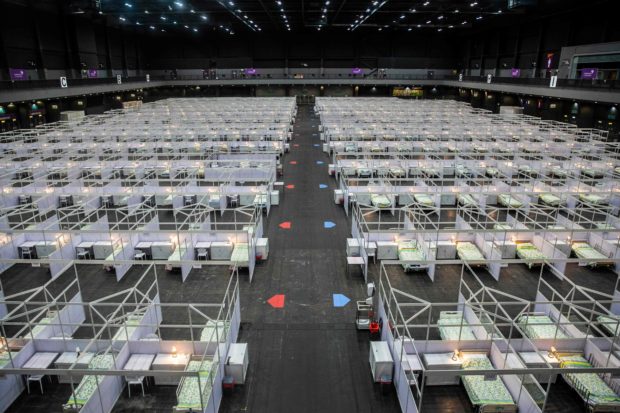Expect ‘lengthy’ coronavirus pandemic, warns WHO

ANTICIPATING THE WORST Hong Kong opens a temporary field hospital with 500 beds for stable COVID-19 patients. —AFP
GENEVA—The World Health Organization (WHO) on Saturday warned the coronavirus pandemic was likely to be “lengthy” after its emergency committee met to evaluate the crisis six months after sounding the international alarm.
The committee “highlighted the anticipated lengthy duration of this COVID-19 pandemic,” the WHO said in a statement, and warned of the risk of “response fatigue” given the socioeconomic pressures on countries.
The panel gathered Friday for the fourth time over the coronavirus crisis, half a year on from its Jan. 30 declaration of a public health emergency of international concern (PHEIC)—the WHO’s highest level of alarm.
Risk level ‘very high’
“[The] WHO continues to assess the global risk level of COVID-19 to be very high,” it said following the meeting.
The new coronavirus has killed at least 680,000 people and infected at least 17.6 million since the outbreak emerged in China last December, according to a tally from official sources compiled by Agence France-Presse (AFP).
Article continues after this advertisementUnsurprisingly, the panel, comprising 17 members and 12 advisers, unanimously agreed that the pandemic still constituted a PHEIC.
Article continues after this advertisementSeveral countries around the world have imposed strict lockdowns in a bid to control the spread of the respiratory disease, plunging economies into sharp contraction.
The outlook is bleak in Asia.
India and the Philippines reported record increases in new daily infections at 57,000 and 5,000, despite restrictions.
“We are waging a losing battle against COVID-19, and we need to draw up a consolidated, definitive plan of action,” 80 Philippine medical associations said in an open letter to President Duterte.
Okinawa, in Japan, declared a state of emergency after a record jump in cases on the island—many linked to US military forces stationed there.
Hong Kong opened a new makeshift hospital to house COVID-19 patients after cases rose to new highs.
Crisis fatigue warning
The WHO emergency committee urged the world body to provide nuanced, pragmatic guidance on COVID-19 management “to reduce the risk of response fatigue in the context of socioeconomic pressures.”
The panel urged the WHO to support countries in preparing for the rollout of proven therapeutics and vaccines.
The committee also urged the agency to accelerate research into the remaining “critical unknowns” of the virus, such as the animal source of the disease and potential animal reservoirs.
It called for improved understanding of the epidemiology and severity of COVID-19, including its long-term health effects.
And the committee wanted more light shed on the dynamics of the virus, such as “modes of transmission, shedding, potential mutations; immunity and correlates of protection.”
The near six-hour gathering was hosted at the WHO’s headquarters in Geneva, with some participants joining via video link.
The committee will reconvene within the next three months.
Effects ‘felt for decades’
Going into the meeting, WHO chief Tedros Adhanom Ghebreyesus said the pandemic’s effects would be long-lasting.
“It’s sobering to think that six months ago, when you recommended I declare a PHEIC, there were less than 100 cases and no deaths outside China,” he said Friday. “The pandemic is a once-in-a-century health crisis, the effects of which will be felt for decades to come.”
The committee warned countries to prepare their health systems to cope with seasonal influenza and other disease outbreaks alongside the new coronavirus.
They were also urged to “encourage global solidarity” on COVID-19 and deal with “mis/disinformation” about the virus.
The WHO has been sharply criticized for the length of time it took to declare an international emergency.
The United States, which accused it of being too close to China, officially began its withdrawal from the organization in July.
The agency has also been criticized for recommendations deemed to be late or contradictory, in particular on wearing masks, or the modes of transmission of the virus.